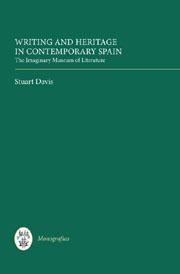Book contents
- Frontmatter
- Contents
- Acknowledgements
- Introduction
- 1 Presenting the Museum
- 2 Never-ending Story: Canon Fever
- 3 Working Models, Model (Re)Workings: Goytisolo and Cervantes
- 4 The Authoritative Gaze: Cristina Peri Rossi
- 5 Generations Apart? The ‘Generation X’ in Spanish Literature
- Conclusion: What do we do with the Gifts of the Past?
- Works Cited
- Index
4 - The Authoritative Gaze: Cristina Peri Rossi
Published online by Cambridge University Press: 05 February 2013
- Frontmatter
- Contents
- Acknowledgements
- Introduction
- 1 Presenting the Museum
- 2 Never-ending Story: Canon Fever
- 3 Working Models, Model (Re)Workings: Goytisolo and Cervantes
- 4 The Authoritative Gaze: Cristina Peri Rossi
- 5 Generations Apart? The ‘Generation X’ in Spanish Literature
- Conclusion: What do we do with the Gifts of the Past?
- Works Cited
- Index
Summary
jamás le reprocharía la artificialidad a nadie: arte y artificio tienen la misma raíz.
Cristina Peri RossiThe survey museums of the world produce a narrative of history of art organized by nations, schools, periods, styles and masters. The virtual feminist museum is an open laboratory rather than a story.
Griselda PollockVisit: Museo del Prado
Should one venture on a Sunday to the Museo del Prado, Spain's eminent art gallery, be prepared to join a queue of the like-minded, eager to experience and see some of the greatest masterpieces of Spanish and European art on a day when entry is free to all. On first approaching the building, towards either the Puerta de Goya or Puerta de Velázquez, the visitor encounters an impressive neo-Classical building, surrounded by immaculately maintained lawns, shrubs and lampposts. Facing the Puerta de Velázquez, a statue of the master painter himself before you, a glance up above the colonnade reveals a frieze depicting King Fernando VII surrounded by mythological representatives and patrons of the arts, gods and muses, protecting the treasures within. Until recently visitors entered the building either through an imposing Puerta or by ascending a grand sweep of external steps; following the incorporation of the Jerónimos cloister and church, however, the visitor is now directed to the rear of the building, towards a new entrance. Through modern glass doors one enters a bright and airy atrium, populated with information desks, a shop, café and cloakrooms.
- Type
- Chapter
- Information
- Writing and Heritage in Contemporary SpainThe Imaginary Museum of Literature, pp. 111 - 145Publisher: Boydell & BrewerPrint publication year: 2012



